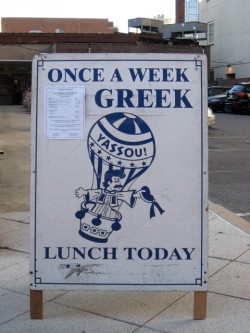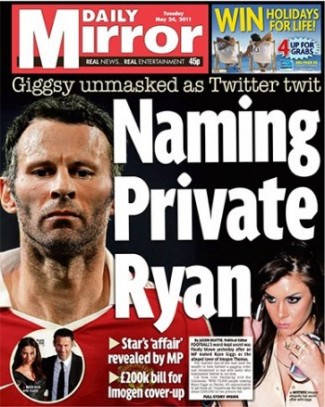Yes, Let's Make The Moon Part Of America

As someone with a very serious interest in seeing Newt Gingrich at the top of the Republican ticket, I was initially disheartened by his recent promise to put an American base on the moon that would eventually become a state. The idea that the moon — a giant piece of space garbage which even Science has admitted is completely worthless — might get itself two (no doubt obstructionist) Senators and a representative in the House is almost too much to take, because it is the moon. It deserves nothing but scorn and pillage. But then I remembered that Republican industrial and environmental policies are essentially designed to promote exploitation and decay, and I suddenly realized that, yes, we should ABSOLUTELY put a base on the moon, and then do to it what we’re doing to our own planet. Go Newt!
Photo by fotum, via Shutterstock
Eat, Pray, Judge: Pastitsio With The Greek Orthodox
by Dan Packel

I’ve always been under the impression that religious spaces were designed to invoke awe in the power of the divine. I’m thinking of the flying buttresses and soaring ceilings of Gothic cathedral architecture, or the sweeping scale and towering minarets of Delhi’s Jama Masjid — extreme examples, for sure. Yet I also presumed that even neighborhood places of worship aimed for similar aesthetic splendor. And maybe that’s the case in their spaces dedicated to prayer. But the spaces where religious groups offer food? Well, as far as I’ve been able to gather during this project to eat cheaply (and satisfyingly, if possible) from the hands of the believers — not so much.
Perhaps this point would be obvious to those who regularly attend church (or synagogue, Bahá’í temple, etc.) or were once active members of a religious community. But while my mother faithfully went to Catholic mass every Saturday evening, I never stepped through the door there, nor did I have anything to do with the Jewish services that were the birthright of both my parents. (The Jewish to Catholic trajectory of my mom’s life, long story.) I’m not sure quite what I expected from religiously affiliated dining halls, but the kitschy grandeur (and white tablecloths) enjoyed by Scientologists appears more and more the exception.
My education in the homely nature of in-church dining spaces continued at Saint George’s Greek Orthodox Cathedral in Philadelphia, which serves lunch to anyone who’s inclined every Friday. The cathedral itself was built in the first half of the nineteenth century by noted architect Thomas Haviland — perhaps most famous for his commission of Eastern State Penitentiary. It’s beautiful, indeed, but for Friday lunches, rather than ascending the steps underneath ionic columns to enter the historic cathedral, visitors skirt the building, heading directly through a pair of modern glass doors in the back, into the community center.
When my friend Jack and I arrived at 1 p.m., attendance in the large hall was sparse. The crowd, such as it was, was sprinkled across ten round tables, each covered with a sheet of thin plastic and holding a vase filled with plastic flowers. Overhead hung three large but austere chandeliers. There were blue splashes on the white walls; these came from posters scattered around the room issued by the Board of Tourism of the Republic of Greece — various images of Aegean seascapes with fishing boats in the foreground and cloudless Mediterranean skies. Despite the posters, the room had a civic cum gymnasium feel to it; push the tables to the side of the room, and I would have been ready to step into a booth and vote — perhaps for whether I preferred the Cyclades to the Peloponnesian Peninsula. From unseen speakers, Greek music filled the air at low volume.

We went to the buffet table and picked up a printed menu: a first for me in these forays. Baked salmon, moussaka, pastitsio, along with roast chicken and lamb shanks. Prices were hefty here, especially compared to the free meals I’d partaken in at earlier stops; the platters ranged from eight to ten dollars, depending on choice of entrée.
Passing up the priciest options, I asked one of the two men standing behind the buffet table for the moussaka, described on the menu as “baked eggplant & potatoes with meat sauce au gratin.” But in a spot of confusion, he started serving me pastitsio instead, and I told him to keep it coming. “It’s like a Greek lasagna,” he informed me in accented English. Confused by certain ambiguities on the menu I had just read, when choosing sides to be added to my plastic plate I overlooked the green beans and walked away having been served both rice and orzo. Conveniently ridged into three compartments, my plate now hosted starch (with meat), starch, and starch. I consoled myself with the thought that it was a cold day outside. I paid my eight dollars to the women conversing in Greek behind the register and grabbed a complimentary piece of bread. Like an auctioneer instituting a minimum bid, I was determined to extract full value from my meal — even if this entailed more starch.
Seated at a table, I imagined a competition between my various starch items, victory going to whichever item seemed to have received the most butter. The tubular pasta beneath the meat sauce in the pastitsio seemed like it had received a generous supplement, and the top layer of the dish was topped with a creamy layer of béchamel that had set. Both my orzo and rice also seemed liberally tossed in butter. Not wanting to be accused of playing favorites, I spread butter from a plastic blister pack onto my bread. There were no losers in this matchup, except, perhaps, my cardiac health.
Any romantic notion I might have held on this January day of sun-dappled olive groves and the heart-friendly character of the Mediterranean diet was dissolving in a pool of warm butter.
The pool of diners thinned out further. Those remaining had clustered into isolated groups of conversation: the three women behind the register; the two men behind the buffet table; one table over, two older fellows, both sporting black Greek Fishermen’s caps that pushed the authenticity meter a notch higher. All of them seemed to be speaking in Greek.
The music grew more insistent as the level of chatter in the room declined. With leaden bellies, we picked up our empty plates and dumped then into a wastebasket. Eager for acknowledgement, I waved farewell to the men behind the buffet, earning a half-hearted response from one. Jack and I exited into the shadows cast by the cathedral, our next destination a bar up the street.
Previously: Bean Pie With The Nation Of Islam Pancakes With The Episcopalians and Lunch With The Sikhs
Dan Packel writes about food (and more!) from his home in Philadelphia. You can also follow him here.
Sixteen Songs For Mitt Romney To Do Laundry To
The new Guided by Voices album, Let’s Go Eat the Factory, starts with the song called “Lasers and Laundry” — which is a perfect sort of song title for recovering D&D; dorks who grow up to be middle-aged indie-rock dorks with non-exciting lives. (A demographic with a large overlap among Guided by Voices fans, I would imagine.) So I’ve been thinking about other good songs about laundry — good songs, perhaps, to play while you do the laundry. I’ve been making a list. And now that we are supposed to believe that Mitt Romney does his own laundry (“Honey, how much detergent should I use?” “Oh, just a little. Like 13.9 percent….”) maybe he’d appreciate some of these tunes, too.
We May Have To Sacrifice Kentucky In The War Against The Birds
They’re just sitting there… WAITING. I don’t like it one bit.
For When You're Not Drinking Straight From The Bottle
“The Trevi Aerating Wine Glass is made for those who take their wine seriously. It uses a unique aerating system to accentuate the taste and smell of the beverage. Inspired by the Trevi Fountain in Rome, Italy, it has a mini glass within a bigger one to siphon the wine through, just like a fountain.”
The Games That Giggsy Plays
The Games That Giggsy Plays
by Emma Garman

A series dedicated to explaining Britain’s manufactured celebrities to an American audience.
Here’s a fun game to play — well, when I say “fun game to play” I suppose I really mean “grim illustration of late capitalism’s warped values that might fleetingly distract you from the pointless quagmire of your own existence.” Anyhoo, fingers on buzzers: of the following, which genre of news story has the longest shelf-life in our ADD-pandering global media landscape: missing white girl with pretty blonde hair; white girl imprisoned for grisly murder; or famous married man sexing women who aren’t his wife? The answer, as established by the indefatigable wonks at Princeton’s Department of Research Studies to Discuss on Buzzfeed or Reddit, is that all three enjoy a statistically equal claim on our attention, and on average will attract 1,250 times the coverage of an outbreak of war, the discovery of a contagious fatal disease or a celebrity’s rad new hairstyle (not counting Jennifer Aniston but definitely counting Jennifers Lopez, Garner and Love Hewitt).
Or rather, that was the status quo until very recently. But the British press, not content with its phone hacking and privacy debates and Liz Joneses and what have you, has willfully thrown the whole delicate system into disarray with its unstinting, unwavering and well-nigh heroic focus on the romantic infidelity of footballer Ryan Giggs, who, it emerged last June (or roughly four centuries ago, in Internet years), had been cheating on his wife Stacey with yet another woman. Admittedly, that the woman in question was married to his younger brother lent some piquancy to the tale, but it is nonetheless impressive to behold the sheer number of daily headlines still dedicated to the “scandal” at the expense of actual news, aka stuff people don’t already know about in byzantine and queasy detail. So why do the casual indiscretions of this 38-year-old Welshman — winger for Manchester United, father of two, millionaire many times over — exert such a powerful pull on the media’s prurient gaze? Since it is this column’s burden and honor to shine a light into the very realms others fear to contemplate, let us seek answers, even if our quest erodes the vestigial fragments of our innocence, as it surely will.

After all, the exposure of Giggsy’s eight-year on-off affair with his brother’s wife — a comely brunette real-estate agent named Natasha — provoked such a profound sense of betrayal and disillusionment in the nation’s esteemed mouthpieces, you’d be forgiven for assuming that prior to 2011, British footballers were renowned for their abstemious habits, civilized conduct and monogamous relationships. (Spoiler alert: they weren’t. Your weary columnist lacks the stomach to elaborate, but inquisitive readers should Google “footballers roasting,” with the proviso that the results will be NSFW and NSF retaining faith in humanity as a species; cf. also the tribulations of our friends Coleen Rooney and Cheryl Cole.) “It rocks everything when you hear things like this,” despaired Coleen Nolan, a showbiz veteran of many years, in the Mirror. “You really can’t know what people are like underneath… I’m just so let down by him.” Well, of course you are, Coleen, and we can only hope that your searing cri de coeur reached some genocide orphans or Guantanamo prisoners, so as to help put their little travails into perspective.
Commentators a shade more cynical and sentient than dear Coleen might have noticed that what Ryan was “like underneath” had been hinted by an immediately preceding scandal, one of such seismic repercussions, it’s been preserved for posterity with its own moniker. Giggsygate had it all: super-injunctions, flouted! The once inalienable right to kiss and tell to the highest bidder, stomped upon! Randoms on Twitter, threatened with prison! Naturally, this Sheridanesque comedy of manners featured a buxom leading lady: former Miss Wales Imogen Thomas, a glamour model and “Big Brother” alum whose previous consorts include model Tyson Beckford, comedian Russell Brand and various Premier League footballers. But lest you imagine that occupying the dizzy middles of post-reality semi-stardom has been a breeze, please understand that with greatness comes sacrifice: “it’s hard to work out if a guy wants to date me because he likes me,” she once lamented, “or because he sees me as ‘Imogen from Big Brother.’” Little did she know that one day her name would be synonymous with a cultural milestone of even huger significance!

Permit me to set the scene: Britain, spring of 2011. Her Majesty’s subjects were enjoying the warmest April for 350 years while psyching themselves up for the looming nuptials of Kate and Wills, little aware that in an office in Wapping, the Sun’s Gary O’Shea — single-handedly playing Woodward and Bernstein’s roles in the historic proceedings — was preparing to eclipse Royal Wedding fever with the bombshell that “lovestruck” Imogen had been “romping” in a “string of luxury hotels” with a “married Premier League star,” sometimes — and sports fans are cautioned to reach for the smelling salts for this next bit — just before key games. Furthermore, the Sun had been “gagged” — in other words, the unnamed player had obtained a High Court injunction protecting his privacy, telling the judge, it later transpired, that Imogen was demanding large sums of money to stay quiet. A brief, and in retrospect ominous, lull preceded the appearance of Twitter account @injunctionsuper, which announced: “Footballer Ryan Giggs had an extramarital affair with Big Brother star Imogen Thomas which lasted for 7 months. #superinjunction” Giggsy’s lawyers, apparently not au fait with the concept of cutting your losses, sued Twitter and obtained an order compelling the site to hand over details of users who had violated the injunction, causing Twitter’s UK traffic to increase by nearly a quarter as countless users tweeted “Ryan Giggs is suing Twitter. I can’t Imogen why.”
As the days lengthened and spring turned into summer, the farce reached its climax with the Scottish Sunday Herald’s publication of a front page photograph of Giggsy with a “censored” bar across his eyes. The next day a Liberal Democrat MP, John Hemmings, dared to speak the footballer’s name in the House of Commons — motivated, he said, by a desire to protect the Twitter violators from prosecution and imprisonment, and also probably by a desire to make his Monday in Parliament marginally less of a snooze.
Just how quickly interest in the illicit liaison of an athlete and a starlet would have blown over had the unexpurgated version been published from the get-go, we’ll never know, although some of us can surmise with withering authority: “Exposure of his extra-marital fling with a pneumatic brunette from kiss and tell central casting would have been at best a two-day wonder,” insisted a Daily Mail reporter, while a Forbes blogger damningly pointed out that Giggsy’s high-priced lawyers clearly weren’t familiar with The Streisand Effect.

Nor had they given due consideration to the legendary wrath of the British tabloids, whose battle-hardened foot soldiers will exact lengthy and savage revenge on anyone foolish or unlucky enough to become an enemy. And so it was that, ironically, Giggsy’s ill-advised attempt to keep one of his affairs classified paved the way for the feeding frenzy that ensued once the story of his relationship with Natasha broke, which itself happened because she heard, along with the rest of the Western world, about Imogen. “When I found out he was cheating with Imogen too,” said Natasha, “I was really hurt.” Opting to soothe her pain in time-honored fashion, she accepted a large check from the News of the World in exchange for unburdening herself of the whole sorry saga, then flew to Spain to avoid any awkward conversations across the breakfast table with her cuckolded husband, Rhodri. Meanwhile, Imogen’s suffering was succinctly evoked in one plaintive tweet: “I just wanna curl up and die today,” an understandable reaction to another woman getting her mitts on the six-figure Murdoch-signed check that’s rightfully yours.
Natasha, who’s now separated but not divorced from Rhodri, has courageously salvaged a high-flying media career from the wreckage of her Sophoclean love triangle. “Celebrity Big Brother” was the obvious vehicle for her hotly anticipated TV debut, and she comported herself with aplomb, resolutely deflecting hostility from both the public and her adversarial housemates. Model Nicola McLean, for instance, on hearing that she’d be sharing camera time with Natasha, sniffed that she “makes money from ruining lives.” (Nicola makes money from having photographs taken of her spray-tanned E-cup implants, thus earning the moral high ground.) In Natasha’s defense, she’s not the only one milking her fifteen minutes for all they’re worth: earlier this month, poor doubly-betrayed Rhodri “opened his heart” to the Sun; his father Danny, from whom Ryan is estranged, granted an in-depth interview to the Star last weekend, and even Ryan’s aunt Joanna has
aired such trenchant views as “he might have a sex addiction. Who knows?”

Poignantly, Ryan stands alone in failing to profit from his shenanigans: his legal bill has been estimated at £250,000 (nearly $400,000), while his enormous income from his many endorsements — including Reebok, Givenchy, Patek Philippe and Fuji — will doubtless have shrunk in the wake of his fall from grace. Still, with a personal fortune of £34 million ($50 million), he’s possibly making ends meet, especially taking into account his current earnings as a player for Manchester United F.C. — the most valuable sports franchise in the world, and also home to this column’s chief nemesis, Wayne Rooney — which are $125,000 a week, the equivalent of a 66,700% pay rise on his first salary from the club as a teenager or, if you’d prefer a more heartwarming example of how satisfyingly British society is organized, 100 times the salary of an NHS ER doctor.
Whether being rewarded so handsomely for kicking a ball around a field confers an obligation on a player to conform to certain behavioral codes — or, as newspapers would contend, automatically makes it “in the public interest” to publicize in three-inch headlines the breaking of those codes — is a raging debate unlikely to be settled anytime soon. But as Prime Minister David Cameron said vis-à-vis Giggsygate, there’s an urgent need to reconsider the regulations governing privacy and the media, including the controversially spiraling use of legal injunctions to safeguard celebrities’ precious sexual peccadilloes. As the law stands, the engine of a super-injunction is the section of the European Convention on Human Rights that enshrines an individual’s right to a private and family life, which Giggsy’s lawyers would have argued was threatened by the Imogen revelations. Do let’s take a moment to imagine the pride of the ECHR’s original drafters, who were responding to the atrocities of the Holocaust and the persecutions under Communism in establishing the international treaty, seeing their legacy invoked to protect a footie player’s right to secretly have it off with the Sexiest “Big Brother” Housemate Ever (as voted for by former male housemates), even if it proved no match for the Internet’s almighty imperative that information be free.

And anyway, perhaps being caught was ultimately a blessing in disguise, because it meant that Giggsy had to take the first step to recovery: Admitting He Has A Problem. Yes, Auntie Joanna’s been vindicated: her nephew has joined the revered company of Michael Douglas, David Duchovny and of course Tiger Woods, to whom he is often compared, in seeking treatment for sex addiction. “Ryan has an illness and he needs my help,” said Stacey Giggs, who henceforth owns the copyright on the phrase “long-suffering wife.” “As long as he does what he has promised our marriage will survive. He never loved Imogen and Natasha is a liar. Our family will come through this.” (When Stacey ran into her sister-in-law outside a restaurant, she was slightly less restrained in her choice of words, informing Natasha: “You’re nothing but a fucking slag!” Her husband yelled at her to get in the car before berating his former fling for selling her story, as drivers stopped their cars to gawk at the spectacle. Natasha, evidently a girl with an admirable grasp of priorities, retorted that she’d used the NOTW money to pay for breast implants.)
Conveniently, the zeitgeisty blend of responsibility-ceding and self-recrimination implied by the sex addict label is precisely what will have helped placate Giggsy’s corporate sponsors, whose idealized presentation of the archetypal sportsman and family man isn’t, or so I’m given to understand, entirely compatible with his current reign as Britain’s Premier Love Rat. Only time will tell if he, like his fellow philandering football star and erstwhile Man U teammate David Beckham, can rehabilitate his “nice guy” image and return to a time when, if his name is mentioned in the media, it’s mostly to do with either his performance on the pitch or a product he’s endorsing — although in the future, advertisers may want to ease up on the Christ concepts like this walking-on-water Smirnoff campaign, whose slogan is Extraordinary Purity.
Looking on the bright side, Giggsy has in the past valiantly overcome such obstacles to role modeldom as an alleged physical assault on his then-girlfriend, toilet paper heiress and Kate Moss’ bff Davinia Taylor, whom he was seen punching in the face and stomach in a nightclub (curiously, nearly all references to the skirmish seem to have been scrubbed from the Internet). Then again, on the rare occasions that Giggsy has spoken spontaneously about his life, he comes across as ill-equipped to cope with the much-decried pressures of living in a fishbowl. Only a little over a year ago, he bemoaned contemporary celebrity culture and its encroachment into football, in words that now read as a tragic goading of fate: “I didn’t become a footballer to be famous, I became a footballer to be successful. I didn’t want to be famous. Now people want to be famous. Why? Why would you want people following you about all day? I couldn’t think of anything worse.”
Previously: Amy Childs, Jordan and Boris Johnson.
Emma Garman no longer lives in her native UK, but she still watches lots of its TV. She’s also on Twitter.
Greg Dulli Does Leonard Cohen
This absolutely terrific Greg Dulli take on Leonard Cohen’s “Paper Thin Hotel” is marred only by the fact that it autoplays and forces you “to endure a Wal-Mart ad that features Korn.” It is still worth it, I promise.
Grindr Monetizes

They may have some slight security issues, but Grindr, the infamous gay “social” app that’s expanding to straight-town, is finding… some ways to make money.
Kate Bush, "Eider Falls At Lake Tahoe"
Guess what is one of Kate Bush’s favorite art forms? Right: shadow puppetry.
